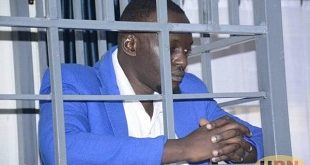
Kampala, Uganda | THE INDEPENDENT | A South African national, Joachim Ugochukwu Onyeako has been sentenced to 30 years in jail for kidnapping with the intention to procure a ransom.
Onyeako was sentenced by a panel of three Court of Appeal Justices comprised of Deputy Chief Justice Richard Buteera, Justices Christopher Gashirabake, and Oscar Kihiika on grounds that the offense to kidnap a one Ross Robert James was planned and well executed in Uganda by international criminals who included Onyeako.
Documents before the Court show that on July 21, 2013, the victim received an email interesting him in an investment opportunity of assisting one Luciana Ford relocate her family fortune of $20 million from Zimbabwe to Australia.
The documents indicate that communications followed after the July email and the victim exchanged telephone contacts with the author of the first email. Other mails were received from one Michael Oweni, the “attorney” of Luciana Ford.
After numerous communications, Micheal Oweni reportedly invited Temailshe or the victim to Uganda to seal the deal with Luciana Ford because Zimbabwe was not safe.
The victim made arrangements to travel to Uganda and was assured by the said Attorney that arrangements had been made for his pickup from Entebbe airport to the Sheraton Hotel Kampala where the two would briefly meet before meeting with Luciana Ford, the would-be partner.
Records further show that the victim was also informed that a reservation for accommodation had been made at the Sheraton Hotel.
According to the court, on arrival at Entebbe Airport, the victim was received by David Onyedeke who ushered him to a car and instead drove him to a homestead in Seguku where the victim was ordered out and ushered into the house with his luggage.
It is said that upon arrival, they met Onyaeko and Sam Iyke who commanded the victim to sit down and forget about going to the Sheraton Hotel to meet Michael, and that upon realizing that he was in danger, the victim complied.
A file folder was presented before the victim by one Sunday Obiora and on opening it, read that he was held as a hostage and would continue to be held unless his people released 650,000 Euros which had to be transported to Uganda by courier and packed in their luggage,” reads the court record.
Records show that they later obtained 10,000 Euros.
As a result, records show that the accused were later arrested by police after taking their victim back to the Airport and accordingly charged with the offense of kidnapping with intent to confine a person and kidnapping with intent to obtain a ransom.
Although others pleaded guilty to the offenses, Onyeako tried to enter a plea bargain which failed and hence went to full trial.
He was then found guilty of the offenses charged and sentenced to 17 years imprisonment by Lady Justice Lydia Mugambe.
Being dissatisfied with the decision of the trial court, he filed an appeal to the Court of Appeal on the grounds that the learned trial Judge erred in law and fact when she conducted the trial with irregularities with regard to assessors.
In their decision in Kampala, the justices found that the sentences handed to him were both illegal and went ahead to set them aside. But imposed their punishments as per the powers given to them to deter offenders in sophisticated crimes.
“The Appellant and his accomplices propagated a crime that required the victims to incur high travel costs to Uganda. The Appellant rented a house, hired vehicles, and recruited staff to perpetuate the offence. The Appellant and his accomplices were arrested in the course of committing a similar offence. That shows that they are not ordinary criminals,”said the Justices.
They said executing these crimes in Uganda put this country into great disrepute which shows Uganda as an unsafe place thereby compromising the tourism sector.
“This court is duty-bound to protect this natural resource. There is therefore need to pass a sentence that will deter this kind of sophisticated crime. As such on count one, the Appellant is sentenced to 30 years’ imprisonment. From that we deduct 8 years that the Appellant has spent on remand. On count two, we sentence the Appellant to 10 years ‘imprisonment and deduct the eight years that he spent on remand. The sentences are to run consecutively, with effect from 16th November 2021, the date of conviction.
***
URN
 The Independent Uganda: You get the Truth we Pay the Price
The Independent Uganda: You get the Truth we Pay the Price


